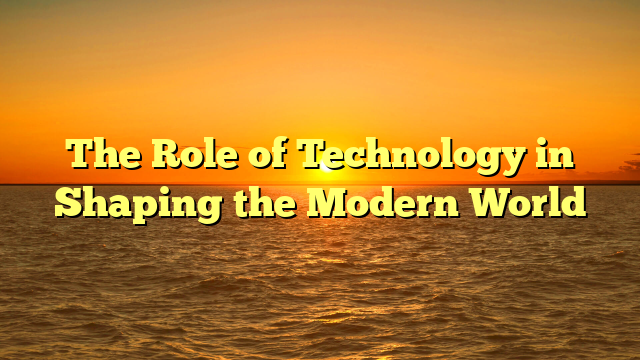Technology has become an inseparable part of human life, influencing almost every aspect of society. From communication and education to healthcare and business, technological innovation continues to shape the way people live, work, and interact. Over the past few decades, the pace of technological advancement has accelerated rapidly, creating new opportunities as well as challenges. Understanding the role of technology in shaping the modern world is essential to appreciate its benefits kingindo127 while also addressing its risks.
One of the most significant impacts of technology is on communication. In the past, exchanging information across distances could take days or even weeks. Today, digital tools such as social media, instant messaging, and video conferencing allow people to connect instantly across the globe. This transformation has not only strengthened personal relationships but also revolutionized professional collaboration. Businesses can now operate internationally with ease, and individuals can share knowledge and culture with a wider audience.
Another crucial area influenced by technology is education. Online learning platforms, digital libraries, and interactive software have made education more accessible than ever before. Students from remote areas can now access quality resources that were once limited to urban centers. Furthermore, artificial intelligence and adaptive learning systems help personalize education, tailoring lessons to individual learning styles. This development has the potential to reduce educational inequality and prepare future generations for an increasingly digital economy.
Healthcare has also seen remarkable advancements due to technology. Innovations such as telemedicine, wearable health trackers, and advanced diagnostic tools have improved patient care and accessibility. For example, doctors can now consult with patients remotely, reducing barriers caused by distance or limited mobility. Additionally, data-driven research and artificial intelligence are helping identify new treatments and predict disease outbreaks. These innovations not only improve individual health outcomes but also strengthen global health systems.
In the business world, technology has redefined the concept of work. Automation, artificial intelligence, and digital platforms are transforming industries, creating both efficiency and disruption. While these tools have streamlined processes and reduced costs, they have also sparked concerns about job displacement. However, new technological fields such as cybersecurity, data science, and renewable energy are generating employment opportunities that did not exist before. Companies that adapt to these changes are more likely to remain competitive in the global market.
Despite its many benefits, technology also presents challenges. Issues such as digital privacy, cybercrime, and the spread of misinformation highlight the darker side of technological dependence. Furthermore, the digital divide—the gap between those with access to technology and those without—remains a major concern, particularly in developing countries. Addressing these issues requires international cooperation, ethical regulation, and continuous investment in education and infrastructure.
Looking ahead, the future of technology promises even more groundbreaking innovations. Developments in artificial intelligence, biotechnology, and renewable energy could reshape entire industries and improve the quality of human life. At the same time, society must carefully manage these advancements to ensure they benefit everyone rather than create greater inequalities.
In conclusion, technology is a powerful force that has transformed the modern world in countless ways. Its influence on communication, education, healthcare, and business demonstrates both its potential and its risks. While challenges remain, the continued evolution of technology holds the promise of a more connected, efficient, and innovative future. The key lies in using it responsibly and inclusively, ensuring that progress serves humanity as a whole.
